THE BLACK_BOX IS A SPACE OF OBFUSCATION
THE BLACK_BOX IS A SPACE OF MEMORY
THE BLACK_BOX IS A SPACE OF KNOWLEDGE, COMMUNAL
(AND BY EXTENSION, ANCESTRAL.)
THE BLACK_BOX IS A SPACE OF KINSHIP
THE BLACK_BOX IS A SPACE OF REGENERATION
THE BLACK_BOX IS A SPACE OF AUTONOMY & LIBERATION
THE BLACK_BOX IS A SPACE OF ABSTRACTION & EXPLORATION
FOREWORD
written circa 2020 by AFIH, digital archivistAll Black ppl have the range to possess skill in any visual artistic field and every musical field. Art traction is dictated by the amount of nonblack apologism you have, how much you enable antiBlackness and how much you benefit from desirability. So it is impossible to say that the arts and music are based on merit. Even through those set of obstacles, more barriers are created when skillsets are hoarded by institutions (usually nonblack run) and careerists (Black AND nonblack) who are granted access to these crafts, studio space and skillsets (often antiBlack watering down of practices started by Black (indigenous) & nonblack indigenous of color).
Techniques should be open sources and Black ppl shouldn’t have to go to university or college to learn any craft. Black ppl & nonblacks who gatekeep techniques & skillsets are afraid that if everyone (especially Black ppl) had access to all the art toolboxes for free that start to lose their traction & support. You see with how all degree art ends up being watered down nondegree Black art/creative output at some point. Matisse could paint like a white European realist but ended up in cut-out art, a staple in Black island art. All Black ppl create “art” and all Black ppl should have access to all art skillsets.
Black ppl cannot gatekeep nonblacks from Black culture because Black ppl do not have power over nonblacks. Black ppl should check nonblacks when they use digital/physical Blackface and make it *uncool* to use Ebonics or Blackface or any other version or any aspect of Black culture but that’s the most we can do as Black ppl. We could also make our own social media sites and local internet but we know there’s always some c*** who invites a nonblack so yea. In the same way that there’s no finite internet security besides not posting about yourself online at all, there’s no way to hide from nonblacks stealing online fully but Black ppl can create more of *culture* behind centering Black ppl and making it taboo for nonblacks to be so *comfortable* online.
NOTES FROM THE ARCHIVE
01
On New Worlds
“We are here five generations after you and a lot has happened. A lot of the things that used to exist when you were 12 and even when you were 28 don’t exist anymore. People broke a lot of things other than silence during your lifetime. And people learned how to grow new things and in new ways. Now we are very good at growing. I’m growing a lot right now and everyone is supportive of growing time, which includes daydreams, deep breaths, and quiet walks. No one is impatient while anyone else is growing. It seems like people are growing all the time in different ways.
It was great to learn about you and a time when whole communities decided to grow past silence. It is hard to read about the fact that sexual abuse, what we would now call the deepest violation of someone else’s growing, used to happen all the time. It is hard to imagine what it felt like for people to walk around with all that hurt from harming and being harmed. But I can tell from the writing that people were afraid so much. History was so close. But the amazing thing is how people spoke and wrote and danced anyway. Imagine being afraid to speak.
Anyway. I wanted to say thank you. Now in the 5th generation since the time of the silence breaking we are called hope holders and healers. There are still people doing a lot of healing, but it seems like generation after generation people got less and less afraid. People took those writings and started to recite them and then another generation hummed their melodies and then another generation clicked their rhythms and then another generation just walked them with their feet and now we just breathe it, what you were saying before about how love is the most powerful thing. About how everything and everyone is sacred.”
Excerpt from “Evidence” by Alexis Pauline Gumbs; from “Octavia's Brood” anthology (edited by Walidah Imarisha and adrienne maree brown), 2015
02
On Black Boxes
blæk ˈbɑːks/
noun
a system or process that uses information to produce a particular set of results, but that works in a way that is secret or difficult to understand.
a device, system or object which can be viewed in terms of its inputs and outputs (or transfer characteristics), without any knowledge of its internal workings. Its implementation is "opaque" (black).
a future artspace built upon principles of Black sovereignty, whose function is to obfuscate Black communities & knowledge from the White gaze.
03
On Visuality & Refusal
“Truth be told, a silent portrait of any black woman is categorically unbearable. Our refusal of words is inevitably embraced as an invitation to impose a narrative that we have neither authored nor authorized. ....refusal to embrace silence is, to me, a powerful modality of reckoning with the impact of the ongoing war currently being waged against black bodies. It is a still-moving-image of refusal—a refusal to explain, a refusal to capitulate, a refusal to be anything else than who we are, even at the cost of death.”
from Black visuality and the practice of refusal by Tina Campt, 2019
04
On “Black Bodies”















 Various Posts by @lateearth.jpg, 2020
Various Posts by @lateearth.jpg, 2020
05
On the Role of the Artist
“The Igbo traditional concept of “Ohaka: The Community is Supreme” is expressed in the indigenous understanding of the artist role’s as service to community. Learning more about this, I began to research conceptual ideas of who an artist is and how art functions. While ‘Ohaka’ is specifically Igbo, this relationship between art and community can be found in many cultural contexts. ...Unlike the artist-individual hierarchy, to them, an artist is a vessel for divine knowledge, which is then expressed publicly. This reminded me of ‘Ohaka’, and other pre-colonial functions of art…”
Excerpt from “How do you understand the role of an artist?: An Introduction” by Yaa Addae, 2020
06
On Dance as Knowledge Transfer
“Jamaican historian Edward Kamau Braithwaite has argued that the this diverse and constantly adapting African culture was able to resist its own destruction because it was ‘carried within the individual (or) community, not (as in Europe) … externalised in buildings, monuments, books, “the artefacts of civilisation” … Dance was African architecture … history was not printed but recited’. In practice, this meant that each transported African carried within them ‘the potential of reconstruction … the ability to use, starting with nothing more than his [sic] nakedness and breath, a whole range of remarkably complex resources’.”
Excerpt from “A Kick in the Belly: Women, Slavery and Resistance” by Stella Dadzie, 2020
07
On Black Indigenous Solidarity
notes on maroonage*
*from the Taino word “cimarron,” later appropriated by spanish colonizers of the island Haiti in the 1500s; originally used to describe non-human plant and animal species that had once been domesticated, but had gone “wild,” “savage,” or “fugitive,” the word was then used to describe once enslaved Afrikans who liberated themselves by escaping the plantation. maroons established communities throughout the colonized “americas,” notably in the regions now called Brazil, Suriname, Jamaica, Haiti, Mexico, Cuba, and the u.s. maroons survived attacks from slave patrols and colonial governments, providing for themselves through communal living, extensive ecological and agricultural knowledge, collaboration with Indigenous peoples of the colonized lands, and raiding the plantations they had once fled from, both for supplies and to liberate more of their enslaved relatives.
notes on “man”
Sylvia Wynter articulates how the current dominant mode of being human is that of the western, bourgeois, cispatriarchal, heterosexual order: “man.” man, through centuries of colonization and enslavement, came to see himself as the only way humans could be, and defined himself in opposition to what man was not: the enslaved Afrikans and their Black descendants. in this self-definition, man placed himself at the peak of the “great chain of being,” his god-given/eugenic evolutionary inheritance of being at the top of the hierarchy of all living and nonliving things on Earth. the worldview of man has been violently imposed across the Earth and through history, devastating lands and Indigenous peoples of Afrika and the “americas” for over 500 years, since 1492 or 1441, through colonization and enslavement.
decolonial maroonage: an anti manifesto
in our present conditions, maroonage can be understood as Black people’s affirmation of Black life, in opposition to the “anthropo...”—in opposition to man’s way of life, which is overrepresented as if it were the only way to be human: capitalism, state, colonialism, anti-blackness, “civilization,” “development,” ecological devastation, cispatriarchy—the plantation, built upon colonized land and the death of the slave and her relatives, the potential maroons. maroons unsettle the foundational premises of man: that the human is distinct from nature; that “man” is distinct from “woman”; that anything can be property for man to “own”; that man can dominate anything that is wild. maroons are Black, maroons are queer, maroons are not man; maroons say fuck the law, fuck the police, fuck the ceo and the shareholders, fuck the man; maroons say land back. maroons are the wildlife that cannot be tamed. and the maroons will burn down man and his plantation.
Excerpt from “Laté Earth” by anonymous, 2020
See: Blindian Country
08
On Gardens & Spaces of Knowledge Transfer
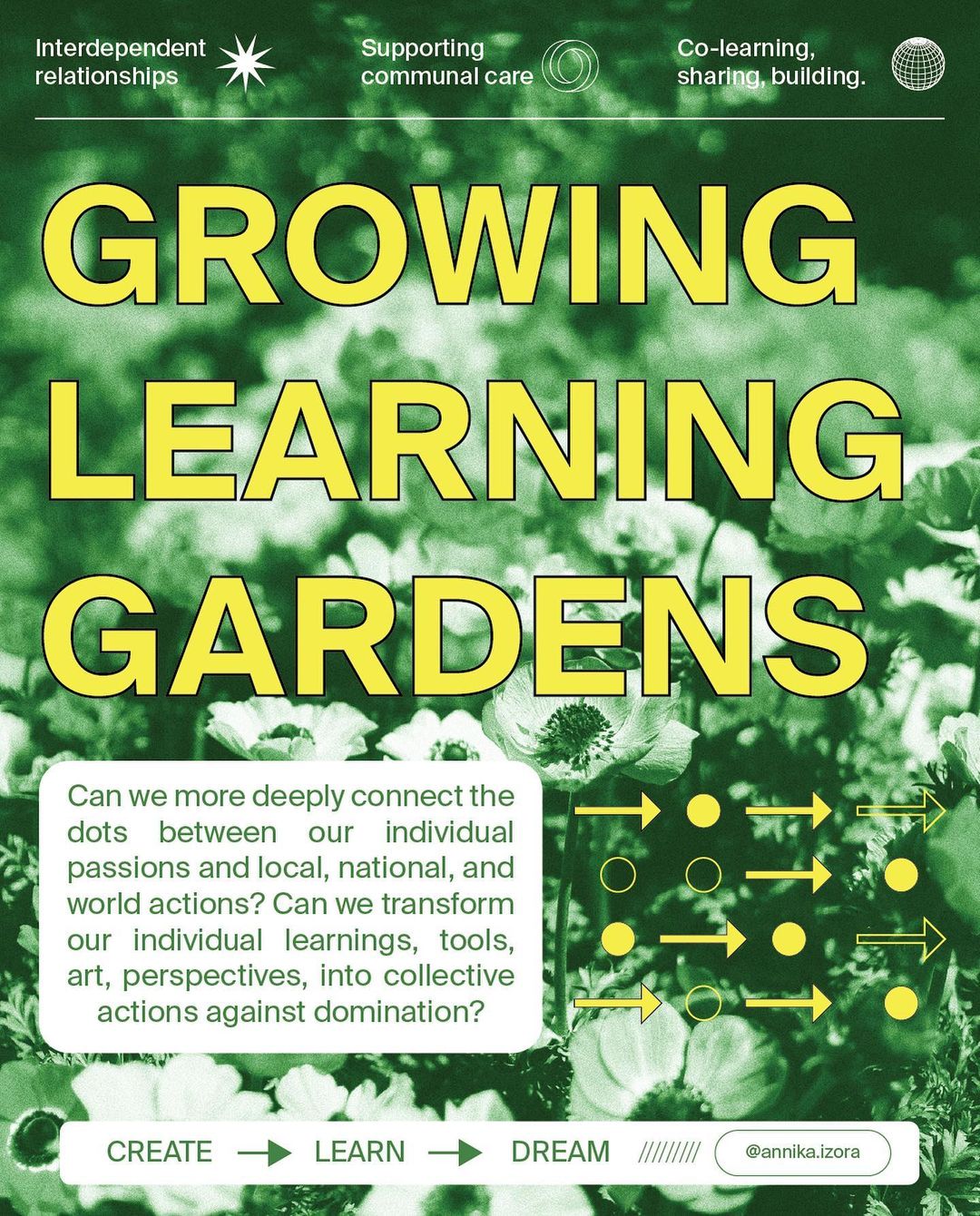
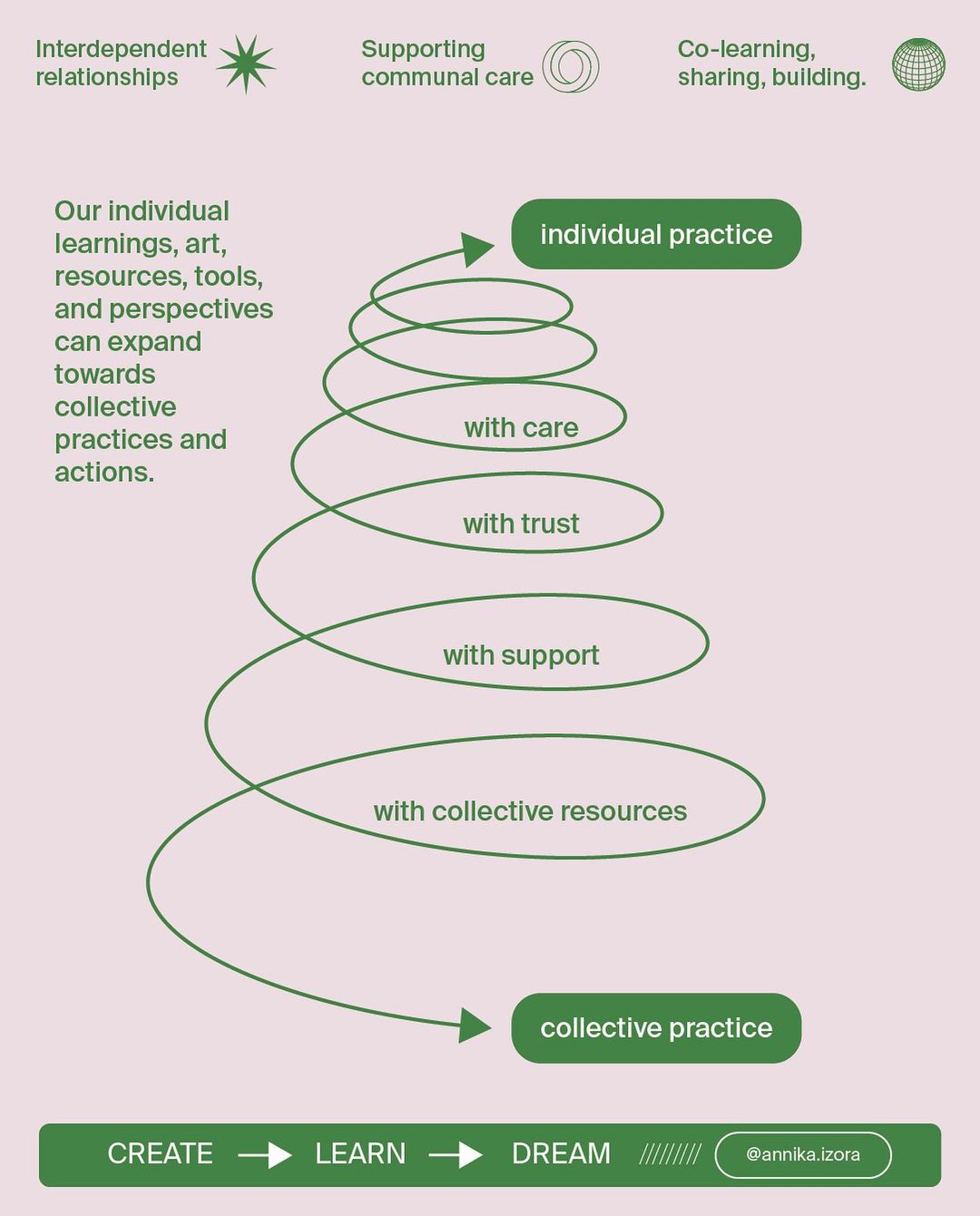
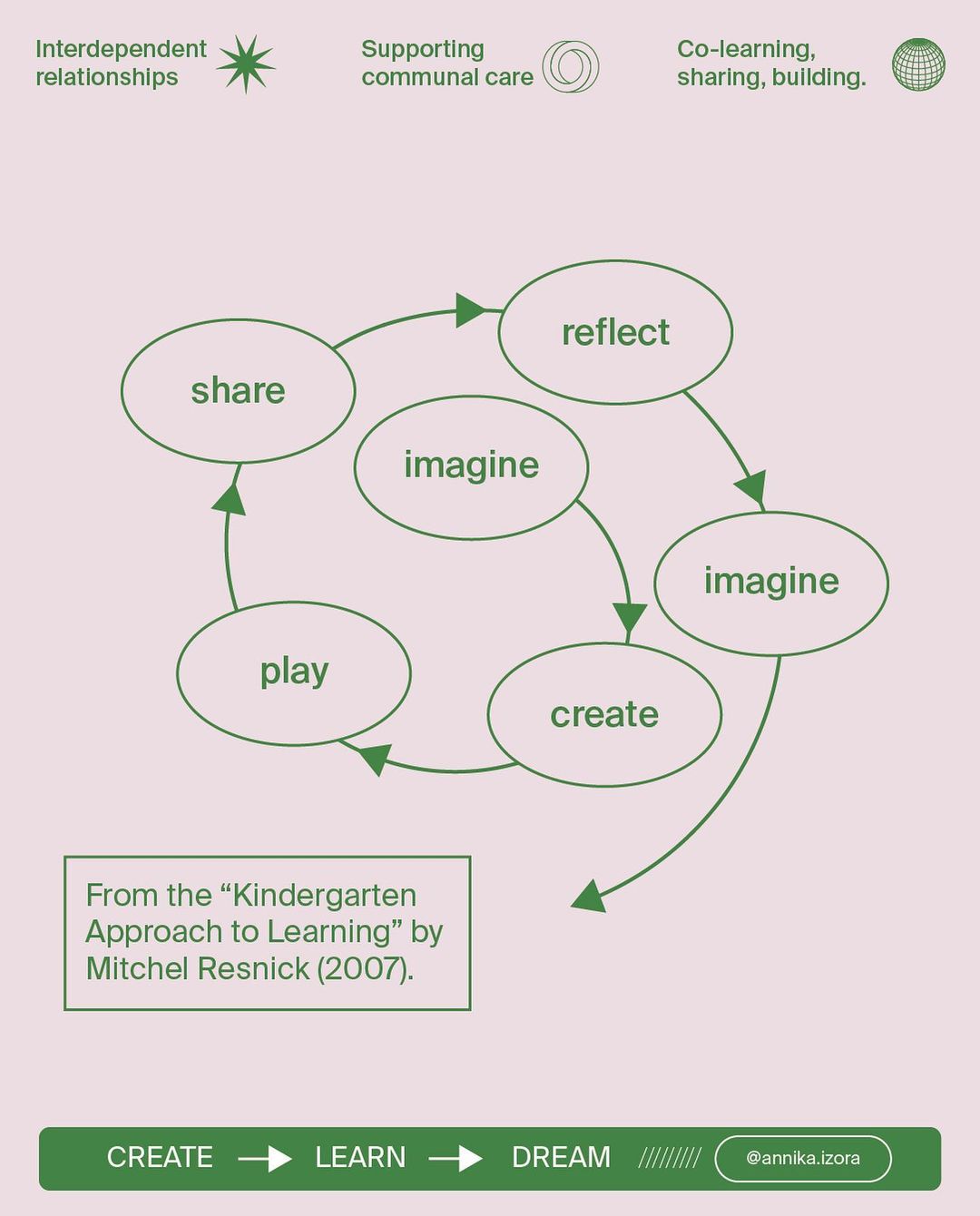
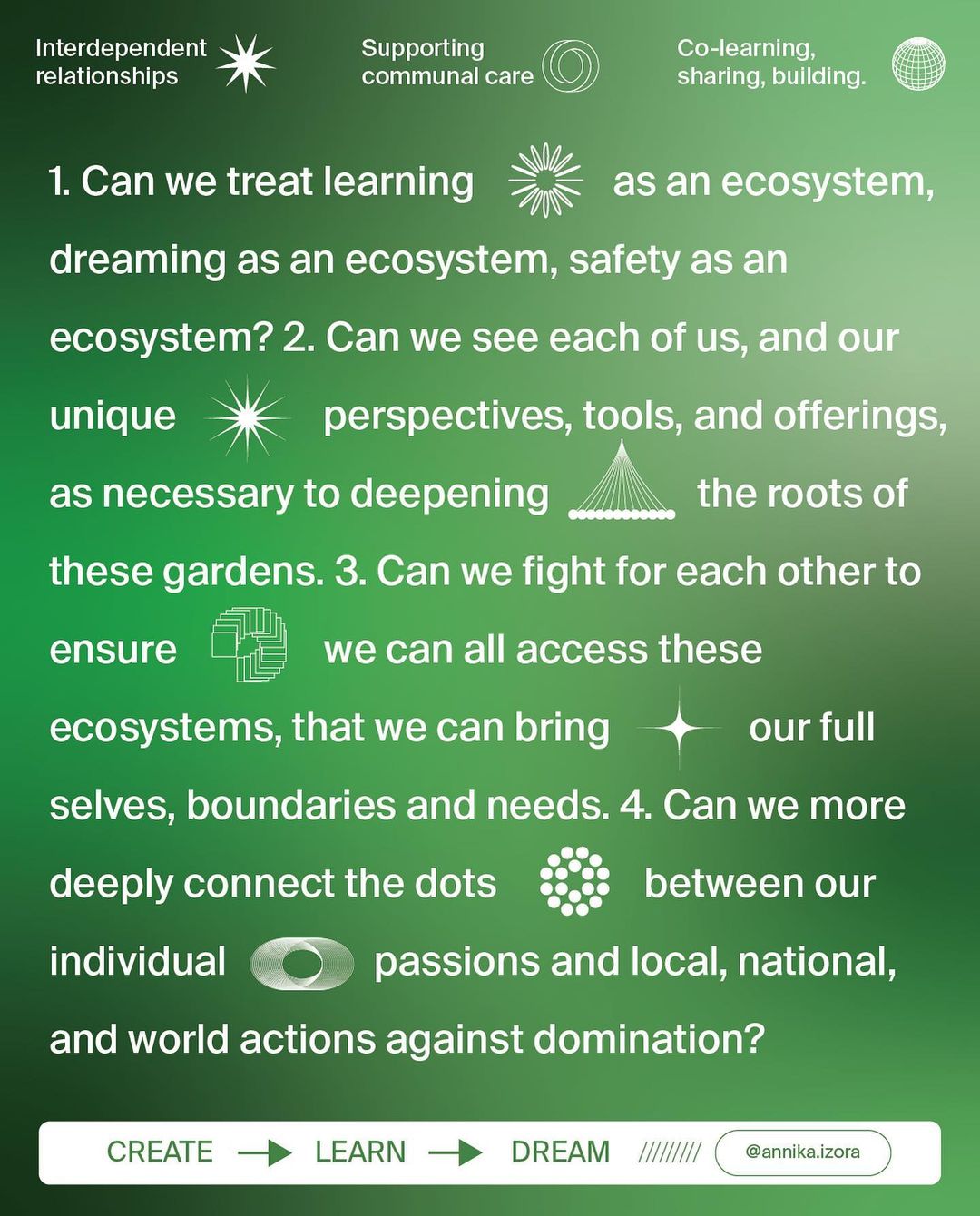
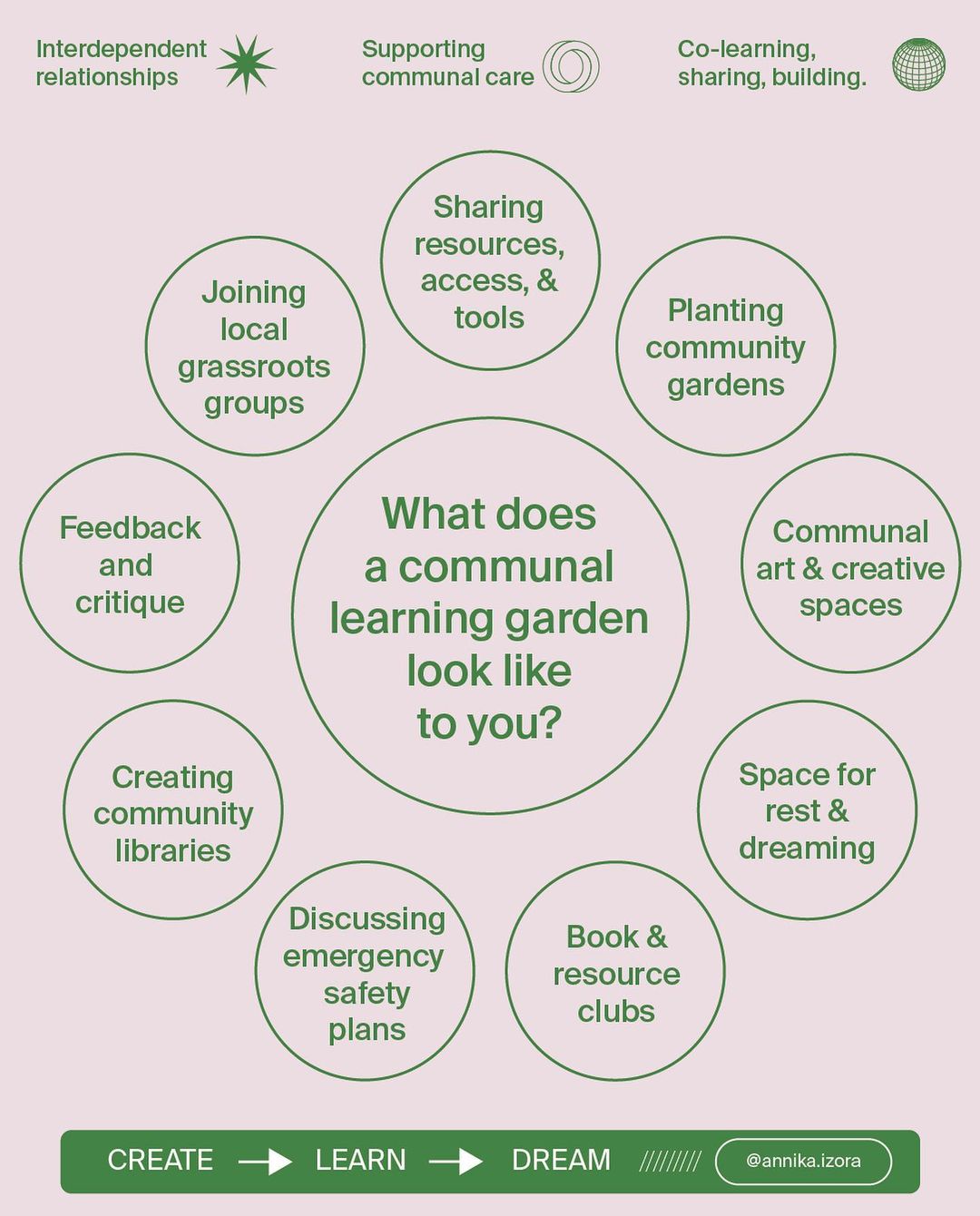 From “Growing Learning Gardens” by Annika Izora, 2020
From “Growing Learning Gardens” by Annika Izora, 2020